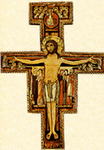Immaculate Conception Often Misunderstood
 Mary, the Immaculate Conception
Mary, the Immaculate Conception
As a Catholic priest I have been surprised by the number of Catholics who seem unaware of what the doctrine of the Immaculate Conception is all about.
Many seem to think that it refers to Mary’s conception of Jesus, but that is celebrated on March 25th, the Annunciation of the Lord to Mary.
As a Franciscan friar, I am delighted to celebrate this solemnity, together with all the members of the Franciscan family, because she is the patroness of the Order of Friars Minor!
The Eastern Churches call this the Feast of the Conception of St. Anne, referring to the mother of Mary (traditionally called St. Ann) conceiving Mary in her womb. The Eastern Christian approach seems a bit clearer in so far as we are referring to Mary being immaculately conceived in the womb of St. Anne. Nevertheless, the Catholic feast of the Immaculate Conception is about Mary being conceived without original sin.
The English were already celebrating this festival in the 12th century. The Franciscans of the Middle Ages took up this teaching and the Franciscan friar and priest Blessed John Duns Scotus, a brilliant theologian at the end of the 13th century, gave sound underpinning to the teaching of the Immaculate Conception. 
He emphasized God’s goodness and love for us by sending us Jesus by teaching that God preserved Mary to be the Mother of God from the very beginning of her life, at her conception, from all sin. Hence, Mary is conceived without original sin, unlike the rest of humanity, so that she could bear God Incarnate in her womb.
Blessed John Duns Scouts, OFM (ca. 1265-1308)
Not only that, because Jesus Christ is the only Savior of the world, and God is not bound by time and space like his creatures are, the merits of Jesus’ obedience on the Cross and the salvation he won for the human race, were pre-eminently given to her prior to the events, so that she could fulfill her singular vocation as Mother of God.
This teaching was not universally accepted and many prominent Medieval theologians disagreed. However, the Franciscan school persisted, believing that this was a very positive approach to God’s Providence and salvation history.
While not a Franciscan novelty and believed in by many for ages, the teaching of Mary’s Immaculate Conception gained greater and greater acceptance over time because it
was understood to magnify the truth of the Incarnation as professed in the Creed. (Some feared that it would super-exalt
Mary as a kind of deity; that was not the intention).
Finally, in 1854, Pope Pius IX declared Mary’s Conception in the womb of St. Anne to be Immaculate and to be henceforth considered an infallible dogma of the Church.
Of course, this became widely popular after the apparitions of the Mother of God at Lourdes, France, to the peasant girl Bernadette Soubirous (later canonized a Saint), when “the Lady” (Mary) declared to the youthful Bernadette in her Pyrenean dialect that she was, in fact, the Immaculate Conception! (The Lourdes Hymn, Immaculate Mary, celebrates Mary's Immaculate Conception.)
The Catholic bishops of the USA declared Mary as immaculately conceived to be the patroness of the nation already in 1846. Hence, it is celebrated almost always as a Holy Day of Obligation in our country, like tomorrow!
What a wonderful festival to keep! God is faithful to his promises, even from the beginning until now. He promised us a Savior, and he delivered, through the Immaculate Virgin Mary. Having preserved her from original sin, God has crushed the power of the enemy through the Cross and Resurrection of Jesus Christ and has defeated the ancient curse against us. We are no longer cursed – we are blessed!


1 comment:
Dr Fr. Kim,
I remember an elderly 'fraternal sister' in the SFO being very upset with me when I explained what you just said. It seems the 'immaculate conception' was confused with the 'virgin birth' and that notion stuck for a long time. In addition today's Gospel reading at Mass can add to the confusion if the priest doesn't take the time to explain. It doesn't hurt to draw attention to the matter as you just did.
I like to invite friars to my 'Perfect Joy' blog on franciscan reflections. Please come when you can to: http://tau-cross.blogspot.com/
Peace and all good.
Post a Comment